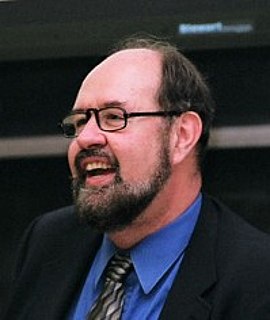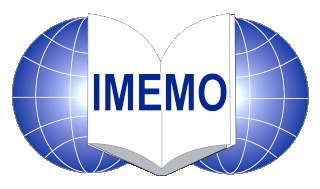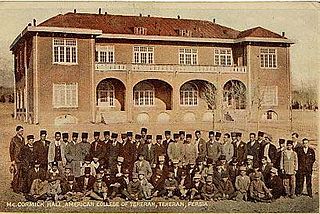
The International Institute for Strategic Studies (IISS) is a British research institute in the area of international affairs. Since 1997 its headquarters have been Arundel House in London, England.

The University of Tehran is the oldest modern university located in Tehran, Iran. Based on its historical, socio-cultural, and political pedigree, as well as its research and teaching profile, UT has been nicknamed "The Mother University of Iran". In international rankings, UT has been ranked as one of the best universities in the Middle East and is among the top universities of the world. It is also the premier knowledge producing institute among all OIC countries. The university offers more than 111 bachelor's degree programs, 177 master's degree programs, and 156 PhD. programs. Many of the departments were absorbed into the University of Tehran from the Dar al-Funun established in 1851 and the Tehran School of Political Sciences established in 1899.

Aga Khan is a title held by the Imām of the Nizari Ismāʿīli Shias. Since 1958, the holder of the title has been the 49th Imām, Prince Shah Karim al-Husseini, Aga Khan IV. All Aga Khans claim descent from Muhammad, last prophet of Islam.

Shāh Karim al-Husayni, known by the religious title Mawlānā Hazar Imam by his Ismaili followers and elsewhere as Aga Khan IV, is the 49th and current Imam of Nizari Ismailis, a denomination within Shia Islam. He has held the position of imam and the title of Aga Khan since 11 July 1957, when, at the age of 20, he succeeded his grandfather, Sir Sultan Muhammad Shah Aga Khan III. The Aga Khan claims direct lineal descent from the Islamic prophet Muhammad through Muhammad's cousin and son-in-law, Ali, considered an imam in Shia Islam, and Ali's wife Fatima, Muhammad's daughter from his first marriage.

Jamatkhana is an amalgamation derived from the Arabic word jama‘a (gathering) and the Persian word khana. It is a term used by some Muslim communities around the world, particularly sufi ones, to denote a place of gathering. Among some communities of Muslims, the term is often used interchangeably with the Arabic word musallah. The Nizārī Ismā'īlī community uses the term Jama'at Khana to denote their places of worship.

Abdolkarim Soroush (عبدالكريم سروش Persian pronunciation: [æbdolkæriːm soruːʃ]; born Hossein Haj Faraj Dabbagh, is an Iranian Islamic thinker, reformer, Rumi scholar, public intellectual, and a former professor of philosophy at the University of Tehran and Imam Khomeini International University. He is arguably the most influential figure in the religious intellectual movement of Iran. Soroush is currently a visiting scholar at the University of Maryland in College Park, Maryland. He was also affiliated with other institutions, including Harvard, Princeton, Yale, Columbia, the Leiden-based International Institute as a visiting professor for the Study of Islam in the Modern World and the Wissenschaftskolleg in Berlin. He was named by Time magazine as one of the world's 100 most influential people in 2005, and by Prospect magazine as one of the most influential intellectuals in the world in 2008. Soroush's ideas, founded on relativism, prompted both supporters and critics to compare his role in reforming Islam to that of Martin Luther in reforming Christianity.

Ali Akbar Velayati is an Iranian conservative politician and physician. Velayati is a distinguished professor at Shahid Beheshti University of Medical Sciences, senior adviser to the Supreme Leader in international affairs and head of the board of founders and the board of trustees of the Islamic Azad University.

Aga Khan University is a non-profit institution and an agency of the Aga Khan Development Network. It was Founded in 1983 as Pakistan's first private university. Starting in 2000, the university expanded to Kenya, Tanzania, Uganda, the United Kingdom and Afghanistan.
Former Iranian president Mohammad Khatami introduced the idea of Dialogue Among Civilizations as a response to Samuel P. Huntington's theory of a Clash of Civilizations. The term was initially used by Austrian philosopher Hans Köchler who in 1972, in a letter to UNESCO, had suggested the idea of an international conference on the "dialogue between different civilizations" and had organized, in 1974, a first international conference on the role of intercultural dialogue with the support and under the auspices of Senegalese President Léopold Sédar Senghor.

William Orman Beeman is an American scholar whose specialty is the Middle East; he is a professor of anthropology at the University of Minnesota, where he is Chair of the Department of Anthropology. He has authored many articles and fourteen books on Iranian politics, theatre, language, and culture.
Ramin Jahanbegloo is an Iranian philosopher and academic based in Canada.

Daryoush Ashouri is a prominent Iranian thinker, author, translator, researcher, and public intellectual. He lives in Paris, France.

The Institute of World Economy and International Relations, or IMEMO, is a leading independent research institute based in Moscow, Russia.
Haider A. Khan is a professor of economics at the Josef Korbel School of International Studies at the University of Denver. He has been widely recognized for his expertise on social accounting matrix (SAM)-based economic modeling, which he employs to study problems in international economics and development. His areas of research include poverty and inequality, environment, foreign aid, trade and investment, as well as economy-wide modeling. Khan is listed among the top five percent of almost 14,000 professional contributors to IDEAS, and his report on women's rights as human rights is among the top ten in the category of political theory and political behavior on the SSRN website.

Stephen Gill, FRSC is Distinguished Research Professor of Political Science at York University, Toronto, Ontario, Canada. He is known for his work in International Relations and Global Political Economy and has published, among others, Power and Resistance in the New World Order, Power, Production and Social Reproduction, Gramsci, Historical Materialism and International Relations (1993), American Hegemony and the Trilateral Commission (1990) and The Global Political Economy: Perspectives, Problems and Policies.

Alexei Mikhailovich Vasiliev is a prominent Russian Arabist and Africanist. Dr. of Science, Professor, full member (academician) of the Russian Academy of Sciences (RAS) since 2011.
Middle Eastern Americans are Americans of Middle Eastern background. According to the United States Census Bureau, the term "Middle Eastern American" applies to anyone of West Asian or North African origin. This includes people whose background is from the various Middle Eastern and West Asian ethnic groups, such as the Kurds and Assyrians, as well as immigrants from modern-day countries of the Arab world, Iran, Israel, Turkey and sometimes Armenia.
Institute for Humanities and Cultural Studies is an Iranian Research institute whose main purpose is the study of humanities.

Mehdi Sanaei is an Iranian academic, politician, and Ambassador Extraordinary and Plenipotentiary of the Islamic Republic of Iran to the Russian Federation (2013–2019). Sanaei was lawmaker at Iran’s Islamic Parliament (Majlis) from 2008 to 2013. He is currently Senior Adviser to the Iranian Ministry of Foreign Affairs and Adviser to the Rector of Tehran University for Russia and Eurasia.

Academic relations between Iran and the United States are a branch of cultural relations between the two countries that became widespread, especially during the Pahlavi dynasty era.















